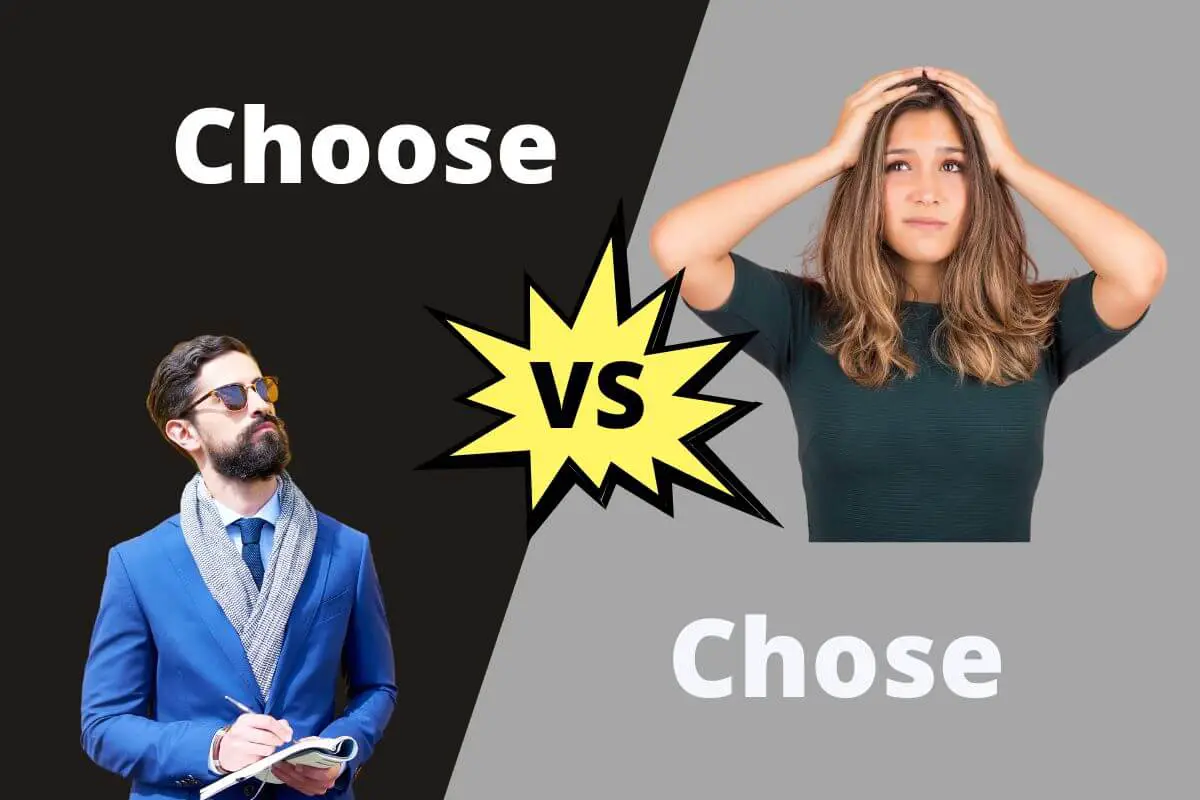Ever found yourself pausing, a little unsure, when writing or speaking, wondering if you should use "chose" or "choose"? You are certainly not alone in this. It's a very common spot of bother for many who are trying to get their English just right. As a matter of fact, these two words, while looking quite similar, actually point to different times when something happened.
Unlike the distinction between "loose" and "lose," which are, you know, two completely different words with their own separate meanings, "choose" and "chose" are forms of the very same verb. That verb, in its present tense form, means to pick something out or make a selection. So, you might wonder, how do you tell them apart? Well, that's what we're going to figure out together today.
This article will walk you through everything you need to know about "choose" versus "chose," including common mistakes people make, some handy tips for getting it right, and even a few practice exercises. By the end, you'll feel much more comfortable using these words correctly, which, you know, really helps make your writing clearer and more correct. It's pretty much about understanding when a decision happened.
Table of Contents
- Understanding the Core Difference
- Why the Mix-Up Happens
- Putting It Into Practice: Examples
- A Simple Trick to Remember
- Beyond Just "Choose" and "Chose": A Quick Look at "Chosen"
- Improving Your English, One Word at a Time
- Frequently Asked Questions About "Chose versus Choose"
Understanding the Core Difference
At their core, "choose" and "chose" are different forms, or tenses, of the same verb. This verb, "to choose," means to select, to pick something out, or to decide on a course of action. The main thing that sets them apart, you see, is time. Think of it this way: one is for now, or for generally, and the other is for then, when something already happened.
Choose: The Present Moment Pick
"Choose" is the present tense form of this irregular verb. It means to select something from a group of options, or to make a decision about what to do right now, or even what you generally do. It's also the form you use for things that will happen in the future, or for commands. So, it's pretty versatile, actually.
This word, "choose," rhymes with "blues." It's the one you pick when you're talking about an action that is happening now, or an action that you might do later. It also works for actions that are always true, or for a general preference. You know, like when you're thinking about what to wear today, or what you usually pick for breakfast. It's about the act of selecting in the present or for the future.
Chose: A Decision Made in the Past
"Chose" is the past tense form of the verb. This means it points to an action that already took place, a decision that was already made at some point before now. If you've already picked something out, or decided on a path, "chose" is the word you'll use. It's about looking back at a selection that has been completed, you see.
This word, "chose," is for events that have finished. If you are speaking of something that occurred in the past, "chose" is the word that fits. It refers to the action of having picked or decided on something from a range of options or possibilities, but, you know, that action is done and dusted. It's a simple past tense verb, really.
Why the Mix-Up Happens
"Choose," "choice," and "chose" are easy to get mixed up. This is because their spellings are pretty similar, and, you know, English can be a bit inconsistent with how vowels sound. My text points out that "choose" and "chose" have only one letter different in their spelling, but they mean very different things because of their tense. It's that subtle 'o' versus 'oo' sound that can throw people off, you know?
The main reason for the confusion, as we've talked about, is that these two words are different forms of the same verb. It's not like "loose" and "lose," which are completely separate words. Here, you're dealing with the same root idea – picking something – but the time of that picking is what changes the word. So, it's not about learning two totally new words, but rather, how one word shifts its shape depending on when the action happened. It's quite a common thing in English, you know, with irregular verbs.
Putting It Into Practice: Examples
Seeing these words in action can really help make things clearer. We'll look at some situations where "choose" is the right word, and then some where "chose" is the one you need. This way, you can start to feel out the rhythm of their proper use. It's all about context, pretty much.
Everyday Use of "Choose"
When you're talking about making a decision right now, or a general preference, "choose" is your go-to word. It's for actions that are happening in the present, or for future plans. So, for instance, if you're looking at a menu, you might say:
- "I need to choose what I want for dinner tonight." (This is a present action, or a future one, you know, deciding right now for later.)
- "Every morning, I choose to drink coffee." (This shows a general habit, something you do regularly.)
- "She always lets her friends choose the movie." (This is about a general practice, a typical way of doing things.)
- "You can choose to be happy today, despite everything." (This is about a present decision, a way to approach the day.)
- "Tomorrow, we will choose the new team captain." (This points to a future action, a selection yet to be made.)
In all these examples, the act of picking or deciding is happening now, or it's a general rule, or it's something planned for the future. It's not something that's already in the past, you see. That's a pretty important distinction.
Recalling Past Actions with "Chose"
Now, when you're talking about a decision that has already been made, something that happened in the past, "chose" is the correct word. It indicates that the selection process is complete. So, if that menu decision is already done, you'd say:
- "I chose the pasta for dinner last night." (The decision and the eating are both in the past.)
- "He chose to study abroad two years ago." (That decision was made in the past, and it's done.)
- "They chose the blue car because it was on sale." (The selection happened at a specific time before now.)
- "She chose her words carefully during the debate." (The act of picking words happened at a past moment.)
- "We chose this path many years ago, and we've stuck with it." (The initial decision was made a long time ago.)
These sentences clearly show actions that are finished, decisions that were settled in a time before the present moment. My text says, if you are speaking of events in the past, "chose" is the appropriate word. It really is that simple, you know.
A Simple Trick to Remember
Here's a little trick that can help you keep them straight, you know, if you're ever feeling a bit stuck. Think about the word "today." If you can naturally use "today" with the action, you're likely talking about the present, so "choose" fits. If you're talking about "yesterday," then "chose" is probably the one you need. It's a bit like a time marker, you see.
Another way to think about it, as my text puts it, is that the main difference between "choose" and "chose" is time. Use "choose" when talking about making a decision now or in general terms. Use "chose" for decisions that were made in the past. It's a very straightforward rule, actually, once you get the hang of it. Just ask yourself: "Did I pick it already, or am I picking it now/later?"
Beyond Just "Choose" and "Chose": A Quick Look at "Chosen"
While we're mostly focusing on "chose versus choose," it's worth a quick mention that there's another form of this verb: "chosen." My text says "chosen" is the past participle form. This means you typically use it with an auxiliary verb, like "has" or "had," to form perfect tenses. So, you know, it's not just about simple past or present. For example:
- "She has chosen a new book to read." (This uses "has" with "chosen" to show a completed action that has a connection to the present.)
- "They had already chosen their vacation spot before the prices went up." (Here, "had" with "chosen" shows an action completed before another past action.)
So, while "chosen" is also about making a selection, it works in a slightly different way with other words. It's good to be aware of it, even if our main focus today is on the present and simple past forms. You know, just for completeness.
Improving Your English, One Word at a Time
Understanding the difference between "choose" and "chose" really does help avoid confusion and makes your English sound much better. It's a small detail, but these small details build up to a clearer, more precise way of communicating. My text says that knowing when to use each one will make your writing clearer and more correct, and that's absolutely true. It's pretty much about precision.
Practice is key, you know, for getting comfortable with these things. Try to pay attention to how these words are used when you read or listen to others. And, you know, try to use them yourself in your own speaking and writing. The more you use them correctly, the more natural it will feel. It's like building a new habit, really. You can learn more about English grammar on our site, which might help you further.
Remember, language is a tool for sharing ideas, and the clearer your tools are, the better your ideas will come across. So, keep practicing, and don't be afraid to make a mistake or two along the way. That's how we all learn, you know. For more help with word meanings, you could check out a good resource like Merriam-Webster's definition of 'choose'. Also, feel free to visit this page for more tips on improving your writing.
Frequently Asked Questions About "Chose versus Choose"
What is the difference between choose and chose?
The main difference between "choose" and "chose" is the time the action happens. "Choose" is the present tense form of the verb, meaning to pick or select something now or in the future. "Chose" is the past tense form, meaning the picking or selecting already happened in the past. It's all about when the decision was made, you know?
When do you use chose instead of choose?
You use "chose" when you are talking about an action of selecting or deciding that has already happened. For example, "Yesterday, I chose the blue shirt." This shows that the act of picking the shirt is complete and in the past. It's for things that are done, you see.
Is choose or chose present tense?
"Choose" is the present tense form of the verb. It's used for actions happening right now, or for general habits, or for future plans. For instance, "I always choose the healthy option." This shows a regular action, something that happens in the present or generally. So, "choose" is the one for right now, or for what you typically do.



